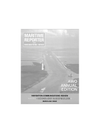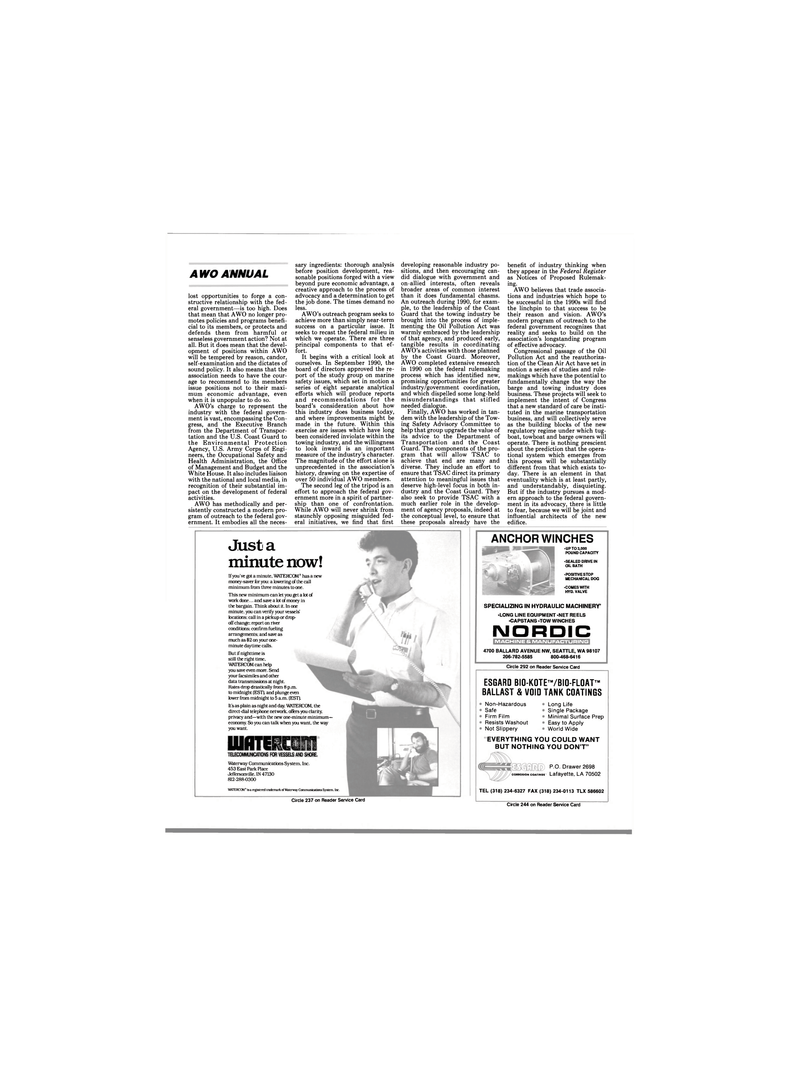
Page 21: of Maritime Reporter Magazine (March 1991)
Read this page in Pdf, Flash or Html5 edition of March 1991 Maritime Reporter Magazine
A WO ANNUAL lost opportunities to forge a con- structive relationship with the fed- eral government—is too high. Does that mean that AWO no longer pro- motes policies and programs benefi- cial to its members, or protects and defends them from harmful or senseless government action? Not at all. But it does mean that the devel- opment of positions within AWO will be tempered by reason, candor, self-examination and the dictates of sound policy. It also means that the association needs to have the cour- age to recommend to its members issue positions not to their maxi- mum economic advantage, even when it is unpopular to do so.
AWO's charge to represent the industry with the federal govern- ment is vast, encompassing the Con- gress, and the Executive Branch from the Department of Transpor- tation and the U.S. Coast Guard to the Environmental Protection
Agency, U.S. Army Corps of Engi- neers, the Occupational Safety and
Health Administration, the Office of Management and Budget and the
White House. It also includes liaison with the national and local media, in recognition of their substantial im- pact on the development of federal activities.
AWO has methodically and per- sistently constructed a modern pro- gram of outreach to the federal gov- ernment. It embodies all the neces- sary ingredients: thorough analysis before position development, rea- sonable positions forged with a view beyond pure economic advantage, a creative approach to the process of advocacy and a determination to get the job done. The times demand no less.
AWO's outreach program seeks to achieve more than simply near-term success on a particular issue. It seeks to recast the federal milieu in which we operate. There are three principal components to that ef- fort.
It begins with a critical look at ourselves. In September 1990, the board of directors approved the re- port of the study group on marine safety issues, which set in motion a series of eight separate analytical efforts which will produce reports and recommendations for the board's consideration about how this industry does business today, and where improvements might be made in the future. Within this exercise are issues which have long been considered inviolate within the towing industry, and the willingness to look inward is an important measure of the industry's character.
The magnitude of the effort alone is unprecedented in the association's history, drawing on the expertise of over 50 individual AWO members.
The second leg of the tripod is an effort to approach the federal gov- ernment more in a spirit of partner- ship than one of confrontation.
While AWO will never shrink from staunchly opposing misguided fed- eral initiatives, we find that first developing reasonable industry po- sitions, and then encouraging can- did dialogue with government and on-allied interests, often reveals broader areas of common interest than it does fundamental chasms.
An outreach during 1990, for exam- ple, to the leadership of the Coast
Guard that the towing industry be brought into the process of imple- menting the Oil Pollution Act was warmly embraced by the leadership of that agency, and produced early, tangible results in coordinating
AWO's activities with those planned by the Coast Guard. Moreover,
AWO completed extensive research in 1990 on the federal rulemaking process which has identified new, promising opportunities for greater industry/government coordination, and which dispelled some long-held misunderstandings that stifled needed dialogue.
Finally, AWO has worked in tan- dem with the leadership of the Tow- ing Safety Advisory Committee to help that group upgrade the value of its advice to the Department of
Transportation and the Coast
Guard. The components of the pro- gram that will allow TSAC to achieve that end are many and diverse. They include an effort to ensure that TSAC direct its primary attention to meaningful issues that deserve high-level focus in both in- dustry and the Coast Guard. They also seek to provide TSAC with a much earlier role in the develop- ment of agency proposals, indeed at the conceptual level, to ensure that these proposals already have the benefit of industry thinking when they appear in the Federal Register as Notices of Proposed Rulemak- ing.
AWO believes that trade associa- tions and industries which hope to be successful in the 1990s will find the linchpin to that success to be their reason and vision. AWO's modern program of outreach to the federal government recognizes that reality and seeks to build on the association's longstanding program of effective advocacy.
Congressional passage of the Oil
Pollution Act and the reauthoriza- tion of the Clean Air Act have set in motion a series of studies and rule- makings which have the potential to fundamentally change the way the barge and towing industry does business. These projects will seek to implement the intent of Congress that a new standard of care be insti- tuted in the marine transportation business, and will collectively serve as the building blocks of the new regulatory regime under which tug- boat, towboat and barge owners will operate. There is nothing prescient about the prediction that the opera- tional system which emerges from this process will be substantially different from that which exists to- day. There is an element in that eventuality which is at least partly, and understandably, disquieting.
But if the industry pursues a mod- ern approach to the federal govern- ment in its advocacy, there is little to fear, because we will be joint and influential architects of the new edifice.
Circle 237 on Reader Service Card
Just a minute now!
UMTiRCDm
TELECOMMUNICATIONS FOR VESSELS AND SHORE.
Waterway Communications System, Inc. 453 East Park Place
Jeffersonville, IN 47130 812-288-0300
WATERCOM * is a registered trademark of Waterway Communications System. Inc.
If you've got a minute, WATERCOM8 has a new money-saver for you: a lowering of the call minimum from three minutes to one.
This new minimum can let you get a lot of work done... and save a lot of money in the bargain. Think about it. In one minute, you can verify your vessels' locations: call in a pickup or drop- off change; report on river conditions; confirm fueling arrangements; and save as much as $2 on your one- minute daytime calls.
But if nighttime is still the right time,
WATERCOM can help you save even more. Send your facsimiles and other data transmissions at night.
Rates drop drastically from 8 p.m. to midnight (EST), and plunge even lower from midnight to 5 a.m. (EST).
It's as plain as night and day. WATERCOM, the direct-dial telephone network, offers you clarity, privacy and—with the new one-minute minimum- economy. So you can talk when you want, the way you want.
MACHINE Si MANUFACTURING 4700 BALLARD AVENUE NW, SEATTLE, WA 98107 206-782-5585 800-468-6416
ANCHOR WINCHES •UP TO 3,000
POUND CAPACITY •LONG LINE EQUIPMENT -NET REELS •CAPSTANS «TOW WINCHES NORDIC •SEALED DRIVE IN
OIL BATH •POSITIVE STOP
MECHANICAL DOG •COMES WITH
HYD. VALVE
SPECIALIZING IN HYDRAULIC MACHINERY'
Circle 292 on Reader Service Card
ESGARD BI0-K0TE™/BI0-FL0AT™
BALLAST & VOID TANK COATINGS
Non-Hazardous
Safe
Firm Film
Resists Washout
Not Slippery
Long Life
Single Package
Minimal Surface Prep
Easy to Apply
World Wide
EVERYTHING YOU COULD WANT
BUT NOTHING YOU DON'T"
P-O. Drawer 2698 corrosion coatings ' Lafayette, LA 70502
TEL (318) 234-6327 FAX (318) 234-0113 TLX 586602
Circle 244 on Reader Service Card

 20
20

 22
22
